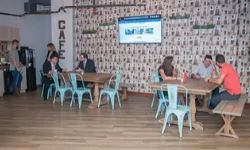Millions of people around the world now work remotely for some, or all of the time. This is made possible by advances in technology and wireless Internet connectivity, but also a realization that working remotely can greatly improve the speed and efficiency at which work is completed, and therefore enhance a company’s overall productivity.
Remote work isn’t just about working from home. There are many different ways to work and collaborate when working virtually, and as new ideas and innovative technological solutions continue to surface, the world of remote work will continue to change and diversify. This glossary reflects some of the key terms currently associated with remote working.
Telecommuting
The practice of making use of telecommunications – such as the Internet, email, and a cell phone – to work from home rather than commuting to a central office location. Telecommuters can also work from other ‘third place’ locations such as coworking spaces, business lounges and coffee shops.
Work from Home
Also known as ‘telecommuting’. Some entrepreneurs and freelancers, as well as permanent employees, can carry out their regular work tasks at home by making use of the Internet, email and a cell phone along with digital tools such as video conferencing and collaboration apps.
Remote Work
Working remotely is the practice of working outside of a traditional office environment, usually at home or in a third place location such as a coworking space or a coffee shop. Remote workers collaborate with their team members through digital apps such as video conferencing and instant messaging, alongside traditional communication tools such as email and phone.
Digital Work
Remote working is usually associated with digital work, or ‘virtual work’, which can be carried out using mobile devices such as laptops and smartphones. It also relies on Internet connectivity, usually with a wireless connection, and digital apps and tools to help workers communicate and collaborate effectively.
[wd_hustle id=”3″ type=”embedded”/]
Digital Nomad
A term used to describe people who combine remote work and travel. As the name implies, digital nomads are nomadic in nature, moving around from place to place and working remotely on a freelance or contractual basis, or as an entrepreneur. Digital nomads normally require a work visa or a travel visa and are able to enjoy their work/lifestyle with the help of mobile technology, wireless Internet connectivity and cloud computing. Typical occupations include travel blogging, freelance writing, web development, design, and consulting, among others.
Freelancer
A person who works on a self-employed basis for different companies. Freelance workers, sometimes known as ‘gig workers’, typically charge by the hour or by the task and often work remotely, using a home office or a coworking space to carry out their work. The rise in freelance work is largely attributed to advances in mobile technology and cloud computing, which enables freelancers to advertise their skillset and work for companies without the need to commute daily.
Gig Economy
Similar to freelancers, ‘gig workers’ are usually self-employed and carry out short-term tasks, known as ‘gigs’, for different companies. The ‘gig economy’ is the term used to describe this labor market, which is characterized by short-term freelance jobs – which can be anything from a delivery service to data entry work to web development.
Virtual Office
A virtual office provides a combination of services, a workplace, technologies, and processes for remote workers. Virtual office services include a business address, mail forwarding, monthly access to meeting rooms or desk space, live receptionist services, a business number, and a VoIP phone system. Businesses can choose which services they need, and can often add or remove services depending on their requirements.
Coworking in Fort Lauderdale
Starting at $225 /mo (view all)
101 Tower ● Cypress Creek Office Center
Cloud Storage / Online Storage
Cloud storage, also known as online storage, is a cloud computing model that allows digital data – such as files and documents – to be stored on remote servers accessed from the Internet, or ‘the cloud’. Cloud storage is a major enabler for remote working, as companies can grant specific people access to cloud-based files, which allows teams to work on the same documents collaboratively.
Virtual Reality
Not to be confused with a virtual office. Virtual reality (VR) is an artificial environment created with software and presented to the user through eyewear or a headset, which enables the user to interact with their environment and feel immersed in it. VR is becoming an important element in commercial real estate and the future of work, as it can be (and is already being) used for virtual workspace tours, architectural design, hands-on training, and more.
Augmented Reality
Not to be confused with virtual reality. Augmented reality (AR) adds artificial features to the reality you would ordinarily see, rather than replacing it. In most cases, people interact with AR technology through a screen, usually a smartphone or tablet, on which images, videos and sounds are overlaid. An example in the workplace is a hologram, which allows people to appear virtually at a reception desk, or in meetings.
Internet of Things
The Internet of Things (IoT) is the technology behind smart buildings and smart homes. It is a network of physical objects – such as vehicles and appliances – which are embedded with electronics, software and sensors to enable them to connect and exchange data. In the workplace, IoT can be used in many different ways. It can provide valuable insights on how people use and interact with their workspace, it improves security by providing smart access, and it can save resources by only heating or lighting areas that are in current use.
Live Receptionist / Virtual Receptionist
A flexible remote receptionist service that provides live call answering, call forwarding, appointment scheduling, and general customer service support. Companies that outsource their call handling to a live receptionist pay on a sliding scale depending on how many live call answering minutes they require each week.
Virtual Assistant
Similar to a live receptionist, a virtual assistant provides remote business support on a flexible basis. In addition to call handling and customer service support, virtual assistants often provide secretarial tasks such as diary management, data entry and cold calling.
Instant Message
Often abbreviated to IM, instant messaging is a form of online chat that takes place between individuals, or teams, using a computer, smartphone or other mobile device. Messaging is real time and requires all participants to use the same application. Examples include Slack, Skype, and WhatsApp. It’s frequently used by remote workers collaborating in teams, as it enables people to send quick questions or answers when working at a distance from one another.
Video Chat
A form of communication using video software that allows users to see and hear each other in real time. When used for business, video chat incorporates multiple people and allows the meeting organizer to share his or her screen and present information to the rest of the group. For remote workers, video chat is a valuable tool as it provides a form of digital face-to-face communication and helps to alleviate the isolating feeling of working separately from the rest of the team.
Business Center
A hybrid workplace environment in which businesses can rent furnished office space, coworking space and meeting rooms, usually under short-term flexible agreements. Formerly known as ‘executive suites’, business centers are staffed and provide a range of services such as receptionist support, call answering, mail sorting and forwarding, and general day-to-day assistance.
Meeting Room / Conference Room
Often found inside business centers and coworking spaces, meeting rooms and conference rooms can be booked by the hour on a flexible basis without the need for membership. This model is useful for any person or team that works remotely, as it enables them to hire meeting space in a business environment with all the necessary facilities, such as furniture, whiteboards, WiFi, and conferencing amenities.
Boardroom
Most business centers and large coworking spaces have at least one boardroom that can be used on-demand by remote workers and local businesses. Boardrooms are usually a premium meeting space and provide high quality furnishings along with audio/visual conferencing facilities.
Online Password Vaults
The rise in digital work and telecommuting means that we now have dozens of different online accounts and passwords to remember. Online password managers help remote workers to keep their devices and data secure by storing all their passwords in one cloud-based environment, accessed by a single master password when required.
VoIP / Virtual Phone System
A VoIP (Voice over Internet Protocol) phone, also known as a virtual phone system, is hosted online and enables the user to make and receive calls from multiple devices using the same number. For instance, calls can be received via a cell phone, tablet or computer. It’s useful for mobile workers or entrepreneurs who often work remotely, and is frequently offered as part of a virtual office.




